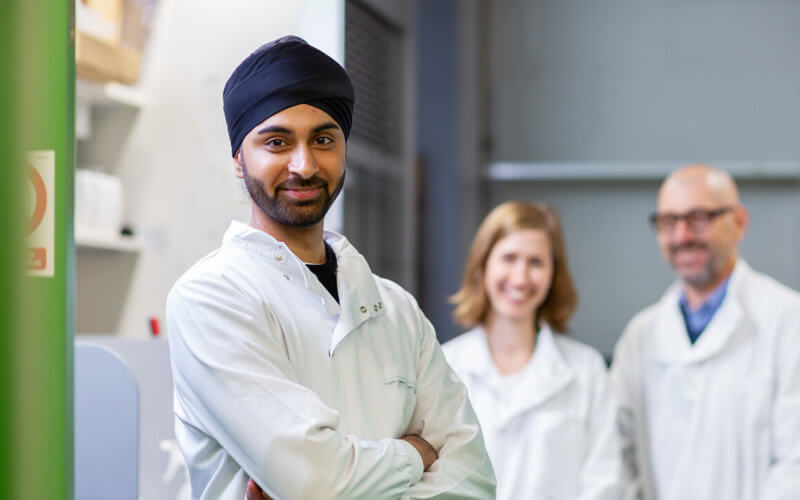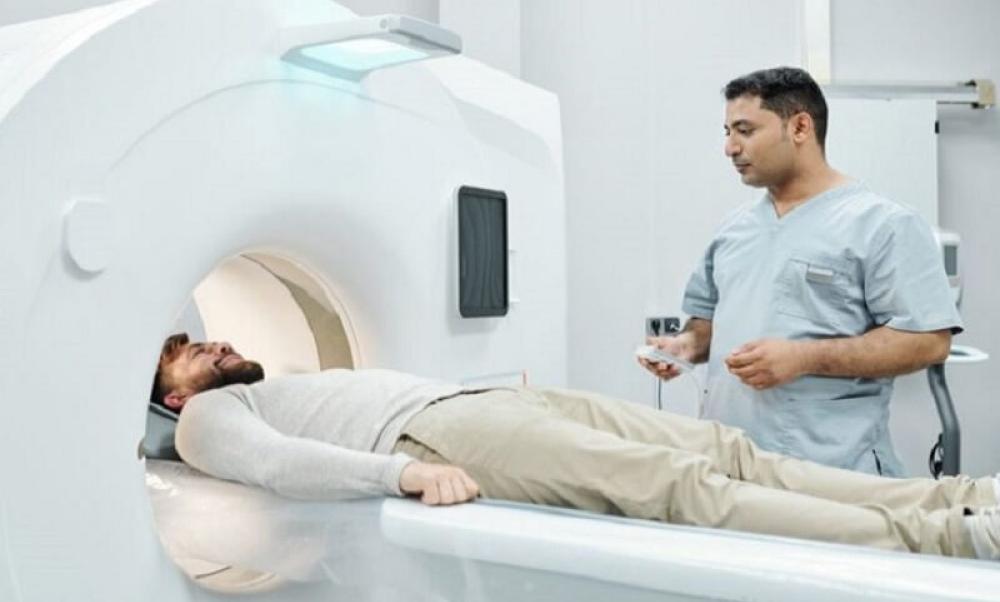Cancer Institute MPhil/PhD
London, Bloomsbury
A full or part-time research degree at the UCL Cancer Institute offers an unrivalled foundation for building a career in cancer. World-class facilities, expert supervision and wide-ranging training opportunities will give you the skills and network to help shape cancer research and practice in academia, biomedicine, or healthcare.
Study mode
UK tuition fees (2024/25)
Overseas tuition fees (2024/25)
Duration
Programme starts
Applications accepted
Applications are accepted on a rolling basis.Entry requirements
A minimum of an upper second-class UK Bachelor’s degree in a relevant discipline or an overseas qualification of an equivalent standard.
-
The English language level for this programme is: Level 3
UCL Pre-Master's and Pre-sessional English courses are for international students who are aiming to study for a postgraduate degree at UCL. The courses will develop your academic English and academic skills required to succeed at postgraduate level.
Further information can be found on our English language requirements page.
Equivalent qualifications
Country-specific information, including details of when UCL representatives are visiting your part of the world, can be obtained from the International Students website.
International applicants can find out the equivalent qualification for their country by selecting from the list below. Please note that the equivalency will correspond to the broad UK degree classification stated on this page (e.g. upper second-class). Where a specific overall percentage is required in the UK qualification, the international equivalency will be higher than that stated below. Please contact Graduate Admissions should you require further advice.
About this degree
Research within the UCL Cancer Institute is diverse and spans various disciplines including molecular and cellular biology, cancer genetics, immunology, genetic engineering, cancer therapeutics and bioinformatics.
Research students on this programme join one of five research departments within UCL's Cancer Institute:
- Cancer Biology
- Haematology
- Oncology
- Pathology
- Clinical Trials.
You will develop your research hypothesis with your supervisors and undertake novel laboratory, bioinformatic or clinical research as part of their research team. You will regularly discuss your data and analyses with your supervisors and share your findings in a variety of forums, ideally leading to presentations at conferences and publication of your work.
Knowledge and skills development is a core priority of the programme, and you will be supported in this area by a supervisory team. In addition to your principal supervisor, you will have a thesis committee which comprises a secondary (subsidiary) supervisor and between one and three thesis committee members.
In your first year, you will have a compulsory training programme run by the Cancer Institute that will improve your research skills and provide networking opportunities. This is in addition to the optional research methods modules offered on the UCL Doctoral Skills Training Programme.
Who this course is for
This course will appeal to high achieving students who want to join a world-class centre in cancer research. It is suitable if you have a strong academic background as a clinician, scientist, or other profession focused on cancer. We welcome students come from around the world and your study will be based in London.
What this course will give you
This programme offers you the following benefits and opportunities.
- A collaborative research environment that spans basic research, translational medicine, and clinical applications.
- Close links with associated clinical trials facilities, experimental cancer medicine centres, biobanking facilities and associated partners and hospitals in London such as the Royal Free Hospital, UCL Hospitals (UCLH), Cancer Research UK and the Crick Institute.
- Developing skills including bench and technical skills, critical evaluation of scientific literature, experimental planning and design, interpretation of data results, presentation/public speaking skills, time and project management, working within a team, working independently, and writing for various audiences.
Making an impact
Case study: Catching and treating more prostate cancers worldwide
Thanks to UCL research, millions of men each year benefit from more accurate diagnosis and treatment of prostate cancer with significantly fewer side effects.
The foundation of your career
Our excellent facilities, supervision and training opportunities prepare you for future careers in academic posts, industry, business, biomedicine, and healthcare.
The lecture on CAR-T for the Cancer MSc programme was the first time I can remember thinking 'Wow! I am interested in this.' Now, my PhD involves the targeting of a glioblastoma-specific antigen and exploring different constructs.

Employability
Graduates go on to academic posts at universities around the world. Other career pathways include laboratory management, research, industry, clinical trials co-ordination, scientific writing and editing, and sales and consulting.
You will also be well placed to go onto further medical training or to take up a clinical post.
Networking
The programme is designed to give you networking opportunities throughout your period of study.
These include weekly internal divisional seminars, a fortnightly external speaker seminars and reception, and student poster sessions. You will also attend the annual Cancer Institute Conference, as well as national and international research conferences, and academic careers days.
After graduating, you will be able to join the Institute's alumni network on LinkedIn.
Teaching and learning
Most of your research will be carried out independently. There will also be a series of training requirements that you will need to complete in the early stages of the programme.
All research students attend a training programme on lab skills from January to July in the first year, which covers:
- Human Tissue Act and the Biobank
- Tissue Preparation and Staining
- Basics of Proteomics
- Principles of Good Clinical Lab Practice
- Clinical Trial Design and Regulation
- In vivo Study Design and Regulation
- Preclinical Radiotherapy
- Single Cell Analysis.
Your first milestone will be to upgrade from MPhil to the PhD degree. For this, you will submit and present a report. In your final year, you submit a thesis covering your research and discuss this at a formal interview known as a viva examination.
Most of your time will be spent conducting independent research, alongside regular meetings with your supervisory team and completing your training requirements. We also encourage you to attend relevant research events at UCL and elsewhere.
Research areas and structure
- Antibody-based therapeutics for imaging and treatment of cancer
- Brain cancer and stem cells
- Cellular and gene therapy for cancer and other blood-related disorders
- Chromosomal DNA replication and cancer
- Effects of tumour biology on therapeutic response, tumour immunology
- Epigenetic changes and cancer
- Genetics of sarcoma, acute leukaemia, chronic leukaemia and myoproliferative diseases
- Medical genomics, cancer systems, science and biomedical informatics
- Signalling networks
- Stratified/personalised cancer medicine
- Therapeutic drug-DNA interactions
- Translational projects, clinical trials and epidemiology
- Viral oncology.
Research environment
UCL is a top-rated university in the UK for research strength in the Research Excellence Framework (REF 2021). Our scientists have an international reputation for leading basic, translational, and clinical cancer research and the Cancer Institute is uniquely positioned to leverage the multidisciplinary nature of UCL by engaging a range of disciplines to transform cancer research.
You will join a community of over 300 research scientists and 120 research students within the Cancer Institute. Our combination of fundamental cancer research, clinical links with UCLH and the Royal Free Hospitals, and collaborative links with the Crick Institute and Cancer Research UK, make the Cancer Institute an exciting environment for basic and translational research into cancer.
In addition to individual supervision from your thesis committee and the UCL Doctoral Skills Development Programme, the Cancer Institute runs a series of skills workshops between January and October of your first year. Some of these are project specific, such as knowledge and intellectual abilities, statistics analysis, and writing research papers or grants.
Other training focuses on transferable skills, including personal effectiveness, engagement influence and impact, research governance and organisation, and networking. You can also gain training credits by doing certain activities which are listed on the Cancer Institute Training page.
You will be invited to discuss your data and conclusions at research team meetings, Institute Research in Progress talks, the annual Cancer Institute conference and Research Student poster day. You will also be encouraged to present at relevant international conferences and, where appropriate, to contribute towards scientific publications in your field.
-
The length of registration for research degrees is usually three to four years for full-time study.
When you accept your place on the programme, you will initially register for an MPhil. You will be eligible to upgrade to PhD student status between 9-18 months.
Within three months of joining the programme, you will be expected to agree the basic structure of your research project with your supervisor, along with the appropriate research methods and a realistic plan of your work.
You will then need to produce and submit a detailed outline of your proposed research for comments and feedback. Following that, you will be ready to undertake the project as part of your supervisor’s research team, sharing your ideas and drawing on the knowledge, expertise, and support of the team.
In your second year, you will continue to explore your research hypothesis and collect and analyse novel data. You will also be expected to upgrade from an MPhil to a PhD.
To successfully upgrade to a PhD, you will need to submit a report summarising your research to date, and to present and answer questions about this work at a viva examination. You will also be expected to present your research to the department at a Research in Progress seminar.
In your third year, you will be expected to complete your data collection and analysis, and to prepare your thesis. You will also be encouraged to present your findings at an international conference or the annual Cancer Institute conference.
Following your third year, you may be eligible to transfer to what is termed 'completing research status' for one year to complete your thesis writing and final viva examination.
-
The length of registration for the research degrees is usually five years for part-time study.
When you accept your place on the programme, you will initially register for an MPhil. You will be eligible to upgrade to PhD student status between 15-30 months.
Within five months of joining the programme, you will be expected to agree the basic structure of your research project with your supervisor, along with the appropriate research methods and a realistic plan of your work.
You will then need to produce and submit a detailed outline of your proposed research for comments and feedback. Following that, you will be ready to undertake the project as part of your supervisor’s research team, sharing your ideas and drawing on the knowledge, expertise, and support of the team.
In your second and third years (18-36 months), you will continue to explore your research hypothesis and collect and analyse novel data. You will also be expected to upgrade from an MPhil to a PhD.
To successfully upgrade to a PhD, you will need to submit a report summarising your research to date, and to present and answer questions about this work at a viva examination. You will also be expected to present your research to the department at a Research in Progress seminar.
In your fourth and fifth years, you will be expected to complete your data collection and analysis, and to prepare your thesis. You will also be encouraged to present your findings at an international conference or the annual Cancer Institute conference.
Following the fifth year, you may be eligible to transfer to what is termed 'completing research status' for two years to complete your thesis writing and final viva examination.
Accessibility
Details of the accessibility of UCL buildings can be obtained from AccessAble accessable.co.uk. Further information can also be obtained from the UCL Student Support and Wellbeing team.
Where you'll study

At the UCL Cancer Institute, you will join a scientific community of over 400 talented scientists. We are dedicated to discovering new techniques in cancer detection and treatment that can make a different to the lives of cancer patients. Our undergraduate, taught masters and PhD programmes reflect the depth and breadth of research expertise within the UCL Cancer Institute. Teaching is predominantly based at the Hampstead and Bloomsbury campuses.
Fees and funding
Fees for this course
| Fee description | Full-time | Part-time |
|---|---|---|
| Tuition fees (2024/25) | £6,035 | £3,015 |
| Tuition fees (2024/25) | £34,400 | £17,200 |
The tuition fees shown are for the year indicated above. Fees for subsequent years may increase or otherwise vary. Where the programme is offered on a flexible/modular basis, fees are charged pro-rata to the appropriate full-time Master's fee taken in an academic session. Further information on fee status, fee increases and the fee schedule can be viewed on the UCL Students website: ucl.ac.uk/students/fees.
Additional costs
Students receive a free printing allowance each year and pay for any additional printing (see details). You may also face additional expenses if you attend conferences. The cost depends on the location, exchange rates, and the price of travel and accommodation, but this may be between £200 and £500 per event, based on typical events / destinations attended by recent students. The Cancer Institute provides two competitive travel scholarships each year to support research students attending training workshops or international conferences.
If you are doing a wet lab project, there may be an Additional Fee Element (AFE, also known as bench fees). This is an additional annual cost related to consumables, equipment or materials based on your individual project. This is payable by your sponsor, or yourself, if self-funding. These additional costs depend on the project and will be the same for home and overseas students.
For more information on additional costs for prospective students please go to our estimated cost of essential expenditure at Accommodation and living costs.
Funding your studies
Annual CR-UK funded clinical fellowships and non-clinical PhD studentships are available. Please check the Cancer Institute website for details. Other funded studentships will also be advertised on the Institute's website as they become available. Some of our students seek funding from their home country or cancer charities.
For a comprehensive list of the funding opportunities available at UCL, including funding relevant to your nationality, please visit the Scholarships and Funding website.
Next steps
Your first steps are to find a supervisor and funding before applying. You should check both the UCL and the Cancer Institute's studentships to apply for specific projects with grants. You can also reach out directly to any potential supervisor, particularly if you have funding in place from another source. You can identify Principal Investigators via the Cancer Institute website and research them individually. If you need help, please see applying for graduate research study or contact the Admissions Tutor on ci.pgreducation@ucl.ac.uk.
You can apply at any time. However, there are three entry points over the year. Deadlines and start dates are usually dictated by funding arrangements and supervisor availability, so discuss this with your supervisors.
Please note that you may submit applications for a maximum of two graduate programmes (or one application for the Law LLM) in any application cycle.
Choose your programme
Please read the Application Guidance before proceeding with your application.
Got questions? Get in touch
UCL is regulated by the Office for Students.


